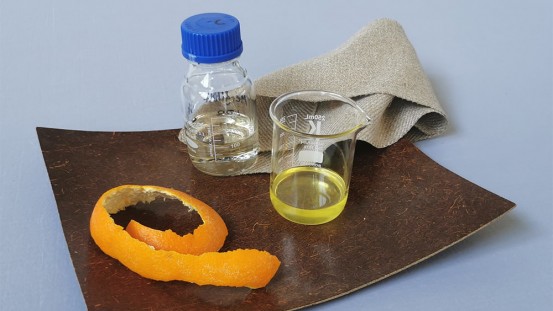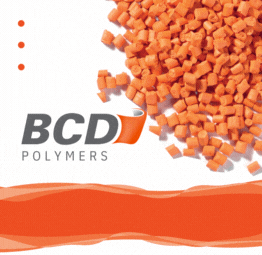The limited number of natural resources and efforts to protect the climate and the environment are leading to an increased demand for innovative products and technologies. The OrangeOil research project, which focused on the production of environmentally friendly epoxy resin systems and formulations from renewable raw materials, has been successfully completed on the way to more sustainable alternatives to polymers derived from crude oil.
Orange oil is the most widely produced essential oil
The aim of the project was to develop two-component epoxy resin systems consisting of an epoxy resin component and a hardener component, where the epoxy resin component is obtained from terpenes derived from orange peel. Orange oil is the most widely produced essential oil with one of the highest growth potentials in the global market, with annual growth rates of around ten percent. It is obtained by cold pressing the ripe peel of the fruit. Natural oils and their extraction from organic waste and production residues (e.g. in the production of orange juice or marmalade) are of particular interest to the chemical industry.
Unique composition and performance
In the course of the project, the Fraunhofer Institute for Microstructure of Materials and Systems (IMWS) developed two fast heat-curing and three slow cold-curing hardener variants with an organic content of more than 90 percent. These variants offer a sustainable alternative to conventional epoxy resin systems. Meanwhile, Tübitak MAM, a leading scientific research institute in Turkey, focused on the extraction and purification of orange oils. A blend incorporating limonene epoxy and limonene dioxide in linseed oil epoxy at a maximum of 25 percent showed significant effects on temperature development during the curing process as well as on curing time. These natural oils not only provide a sustainable alternative to conventional solvents, but also give the composites a unique composition and performance.
Production of natural fiber reinforced composites
SKZ has contributed its expertise in processing the developed bio-based resin for the production of natural fiber reinforced composites. Limonene epoxy and limonene dioxide as formulation components have great potential for various applications, including flooring and fiber-reinforced plastics. A demonstrator has been successfully developed to show the potential applications of these epoxy resin systems in practice.
"The results of the OrangeOil research project mark a significant progress in the development of sustainable epoxy resin systems and I would like to thank all project partners for their productive cooperation and the project committee for their support," says Dr. Jana Fiedler, project manager of the project. "The use of terpenes from orange peels as a raw material not only allows to reduce the dependency on fossil raw materials, but can also contribute to the development of environmentally friendly materials for various industrial applications."
Wide range of market sectors
The results of the project will provide SMEs with a resin-hardener mixture made from almost 100 percent renewable resources. An epoxy resin system made from renewable resources is targeted at a wide range of market sectors, including rail vehicles, sports equipment, the automotive industry, architecture, shipbuilding and interior design. The project thus makes an important contribution to the development of new production technologies and new materials for the processing industry, and meets both economic and climate and environmental protection requirements.



